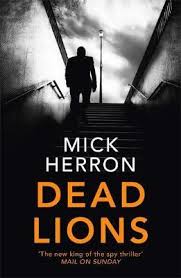Goodreads meta-data is 4.2/5 by 2745 litizens.
Genre: Thriller diller.
Verdict: The study in organisational pathologies continues.

We used to teach something call Org Theory which bore little relation to Org Practice. This book does. Anyone who works in a large organisation will recognise the pathologies exhibited by many of the characters.
The set-up? Two of the Slough House crew are seconded by James Webb, known as Spider, to provide purely nominal security for a visiting Russian tycoon. Why two slow horses for the job, oh, because there is flap on at the Park. Something about office furniture. As always there is never any paperwork to justify the assignment. No paper trail for the FOI rats to find.
Why did I find it credible that a mighty organisation like the Secret Squirrels of MI5 might grind to a halt while an argument with accountants about office furniture takes precedence. Goal displacement comes in many forms. Of course, the furniture is only a means. The end is for two ambitious opponents to fight for supremacy within the organisation. The battle ground? An Eames chair.
Both of the slows, Min and Louise, hope this assignment might restore them to the shining light of the Park, ending their tedious exile to the outer darkness of Slough House, which per the earlier review on this blog is neither in Slough nor a house.
Webb is counting on that motivation to preclude them asking too many questions about this verbal secondment. In meeting them directly he bypasses the supremo of Slough House, Lamb.
There are so many wheels within wheels that my head got in a spin. Rather try to unravel that I offer a few remarks. Nit picking perhaps.
One of the salutary lessons is how easy it is to be fooled if one wants to fooled. Webb’s bit on the bait after reading all about the Russian on the Russkie’s web site. He found there flattering portraits from the ‘Financial Times,’ interviews in ‘Der Spiegel,’ and testimonials from here and there. He looked no further. It was not until Tech Boy Rod cross-checked these excerpts on the Russian’s blog with the original sources that Webb learned, much too late, that they were fake news. There were no laudatory accounts on the pink pages of the ‘Financial Times’ nor in the Gothic script headlines of ‘Der Spiegel.’
What have teachers said since Odysseus returned? Check the original to see if there really was a horse.
Webb did not verify anything because he dearly loved the idea of doing a favour for major player in Russia, a favour that could be cashed later. Ergo, he saw what he wanted to see and nothing more. In his case a successful deal would lead to a promotion up the greasy org pole. Once promoted he would move on away from any fallout anyway.
That is the other lesson. Later when asked who set up the contact, Webb tried to make it sound like his initiative. It wasn’t but he wanted the credit for spotting the possibility of indebting this fellow. When finally he later reluctantly admits that the Russian contacted him first, the tale takes on a different light. It seems it was Webb who was being reeled in and not the Russkie.
 The London sky line these days.
The London sky line these days.
Back to those nits, I found it hard to believe that Dickie would spot the hood quite that easily after all those years. Equally hard to believe was that Dickie did not wonder why it was so easy. Likewise that hood’s boss had lived quietly in England for nearly twenty years seemed a stretch, and in two different places. Even more so the villain’s faith in the dead lions, of whom in the end we learn nothing.
There a few more quibbles but that is what they are quibbles.
Less and less in writing is one legacy of Prime Minister Tony Blair, or so I have been told by a one-time inmate of Number Ten. In that administration, verbal communication became the order of the day to avoid written records. Freedom of Information applies only to what is in writing, after all.
Skip to content
